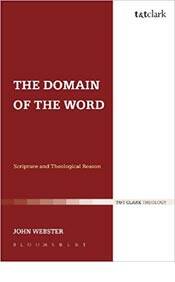I am not the first to observe that the loss of John Webster in May of 2016 was not only the loss of a leading theologian, mentor, and friend. It was also a loss for the discipline of systematic theology. Friends and I spoke of John’s yet to be published systematic theology in the way that children speak about Christmas in July: though its arrival was still a long way off, the promise of its eventual publication buoyed our hopes for the future of Christian dogmatics.
John’s systematic theology will never see the light of day, and we are the poorer for it. Yet there is something about the way he practiced theology that offers, I think, a lasting contribution to the discipline. John envisioned and practiced theology as “an act of contemplative intelligence,”“Principles of Systematic Theology,” 134, in The Domain of the Word: Scripture and Theological Reason as a work of renewed reason disciplined by a singular object of love, the blessed Trinity. John of course did not invent this approach to theology. He learned it from the great doctors of the church, both catholic and Protestant, that sought to expound each element of biblical teaching sub ratione deitatis. As he understood it, such a singular, God-centered focus did not constrict theology’s gaze but oriented theology to its fecund source, providing an orientation whereby all the gifts God bestows upon us in nature, grace, and glory could be contemplated and commended in their varied forms of excellence and splendor.
It sounds strange to say that one of John’s lasting contributions is to remind theologians what it means to honor God as the center of systematic theology. Isn’t that just what “theo-logy” is: the science of theos, God? The fact (which John knew all too well) is that the broader culture of academic systematic theology over the past couple of centuries has not always taken God as its primary preoccupation. One thinks not only of the examples of Schleiermacher or Ritschl but also of more recent approaches that take the church’s public witness or hermeneutical analysis of the (historical, gendered, ethnic, etc.) context of human understanding to be the central subject matter of systematic theology. It is within the (often) arid conditions of these forms of modern theology that John Webster’s approach blows like a fresh breeze.
The 2009 article, “Principles of Systematic Theology,” provides a clear and programmatic statement of John’s God-centered approach to theology applied to the topic of theological prolegomena.
Analysis by Principles
Theological prolegomena considers the nature and task of theology. Discussing theological prolegomena under the banner of “principles” is John’s way of orienting the nature and task of theology to their proper source and end in God. According to John, we may only understand and practice theology well if we acknowledge theology’s dependence upon the triune God, the self-subsisting and self-communicating One.
The blessed Trinity alone is self-subsisting. What is the significance of this fact for the character and practice of theology? If God alone is self-subsisting, then theology and theologians, like the rest of God’s creatures, are wholly dependent. Theology is not a self-establishing, self-standing discipline.
Nevertheless, theology does not depend upon other disciplines such as philosophy or apologetics to justify its existence. We may only understand and practice theology well if we acknowledge theology’s dependence upon the triune God, the self-subsisting and self-communicating One.Theology depends upon the being and activity of God. And this form of dependence is not servile because the God upon whom theology depends is not only self-subsisting, he is also self-communicating. Theology exists because God knows and loves himself in the bliss of the holy Trinity and because God wills to make us happy by making himself an object of creaturely knowledge and love.
Practiced in the presence of the self-subsisting, self-communicating God—however contrary its cultural circumstances, however weak and sinful its practitioners, theology is possible. Theology is “made possible and fruitful . . . by the infinite power of divine goodness shedding abroad the knowledge of itself. That movement, in its boundless depth and its capacity to overcome the mind’s estrangement from its creator, constitutes the principles of systematic theology” (135).
Following a long tradition of Protestant theology, John identifies the holy Trinity as the ontological principle of theology, the Word of God in Holy Scripture as the external cognitive principle of theology, and “the redeemed intelligence of the saints” (135) as the internal cognitive principle of theology. Analyzing each of these principles enables theology to trace its nature and task to their divine source and goal.
In terms of the ontological principle, John describes our theology as a moved movement. God’s own knowledge and love of himself (“archetypal theology”) creates and secures the possibility of our knowledge and love of God (“ectypal theology”) and guides our knowledge and love of God through this vale of tears (“the theology of pilgrims”) to their proper fulfillment in the vision of God (“the theology of the blessed”). In terms of the external cognitive principle of theology, he locates the nature and interpretation of Holy Scripture (themes especially prominent in the last decade of John’s life) not merely within the historical and literary conditions of their production and reception but in relation to God’s revelatory goodness as it accommodates itself to human capacity and makes prophets and apostles its authorized and anointed embassy. In terms of the internal cognitive principle of theology, he articulates a non-competitive account of creaturely intelligence in relation to the Spirit’s creative, reconciling, and sanctifying agency. “Created intelligence is just that—created. But ‘created’ does not mean: separated from the presence and action of God the Spirit, but: formed, accompanied and enabled by the Spirit to undertake its creaturely task in the realm of regeneration where Word and Spirit govern and perfect creaturely life and agency” (141-42).
On Systematic Theology
This conception of the principles of theology in general informs John’s account of systematic theology in particular. Here he discusses the object of theology, the systematic arrangement of theology, and the relation of systematic theology to Holy Scripture.
The object of theology is “God and all things in relation to God.” To honor the centrality of God in systematic theology is not to exclude other topics but to relate them to their triune source and end. John worries that much modern theology has so preoccupied itself with the works of God that they have become untethered from the generative ground and goal that gives them meaning. A well-ordered account of God’s works, however, will consider “God’s works not only as they present themselves in their outer face or temporal structure and effect, but also in terms of the uncreated depth of God from which they flow” (144). To honor the centrality of God in systematic theology is not to exclude other topics but to relate them to their triune source and end.This consideration requires that systematic theology give consideration, then, not only to God’s works but also to God’s being. Only as we come to appreciate the antecedent fullness of God’s triune life may we appreciate the character of God’s works as God’s works.
Consequently, whatever order and arrangement systematic theology follows in treating its various topics, the metaphysical priority of God’s triune fullness must be acknowledged. “A systematic theology cannot be arranged simply as a string of topics; rather, ‘the formal interest engaged’”—John here cites Thomas Aquinas—“must determine the arrangement” (145). The Trinity alone, John insists, is the article on which the church—and its system of theology—stands or falls.
While systematic theology considers how each doctrine is ordered fundamentally to the doctrine of the Trinity, it also considers subordinate relations between each doctrine. Here the historical shape of the economy of God’s works is also determinative for the system of theology. Systematic theology traces the dramatic plot of God’s works from the production of creatures out of nothing to their perfection in God’s eternal kingdom, acknowledging the centrality of the missions of the Son and the Spirit in realizing the Father’s eternal plan for the fullness of time. Each doctrine in systematic theology holds a vertical relation to the doctrine of the Trinity and a series of horizontal relations to various elements in the unfolding economy of nature, grace, and glory.
This explains John’s dissatisfaction with Geerhardus Vos’s way of distinguishing the disciplines of biblical theology and systematic theology. Because systematic theology is concerned with providing a conceptual representation of biblical teaching in both its form and matter, it cannot surrender the historical arrangement of topics to another discipline. Systematic theology, at the end of the day, is nothing more than a commentary on biblical teaching that seeks to make us better readers of the biblical text as God leads us to our eternal happiness in him. Because the Bible presents God as the alpha and omega of all things, systematic theology thus operates according to a God-centered organizing principle. Because the Bible presents all things as an unfolding historical economy of God’s works, systematic theology operates according to a dramatic organizing principle as well.
Conclusion: Systematic Theology as an Exegetical Discipline
The academic theological culture in which I was trained excelled in preparing students in micro-exegetical skill and homiletical prowess. When it came to macro-hermeneutical synthesis of biblical teaching as a whole, the discipline of biblical theology seemed to offer the most sophisticated and compelling results. For me the writings of biblical theologians such as Geerhardus Vos and Meredith Kline opened new vistas for perceiving the unity and beauty of biblical teaching, vistas to which I was eager to direct others for their edification and enrichment as well. Though I read many of the standard modern systematic theologies over the course of my preparation for ministry, they offered neither the hermeneutical sophistication nor the compelling cosmic vision that I found in biblical theology. Thus, when I began teaching systematic theology in 2001, I felt in many ways that I was entering a perhaps necessary but certainly less distinguished discipline. Systematic theology, I knew, was responsible for offering a comprehensive interpretation of the Bible as a whole, but its ordering principles, I was taught by many, were ahistorical and philosophical, determined more by the needs of the contemporary cultural audience of reception than by the literary forms and redemptive-historical shape of the prophetic and apostolic gospel of God.
Along with a handful of others responsible for the revival of systematic theology in the English-speaking world in recent decades, John Webster helped me appreciate the promise of systematic theology as an exegetical discipline. His “Principles of Systematic Theology” demonstrates how systematics can orient us to the central subject matter of Holy Scripture, the triune God, and the unfolding drama of his works that flow from and through and to him in nature, grace, and glory. This orientation, above all, animated John’s theology in its mature form. I pray it will continue to animate the discipline of systematic theology in days ahead.







Comments
Be the first one to make a comment!